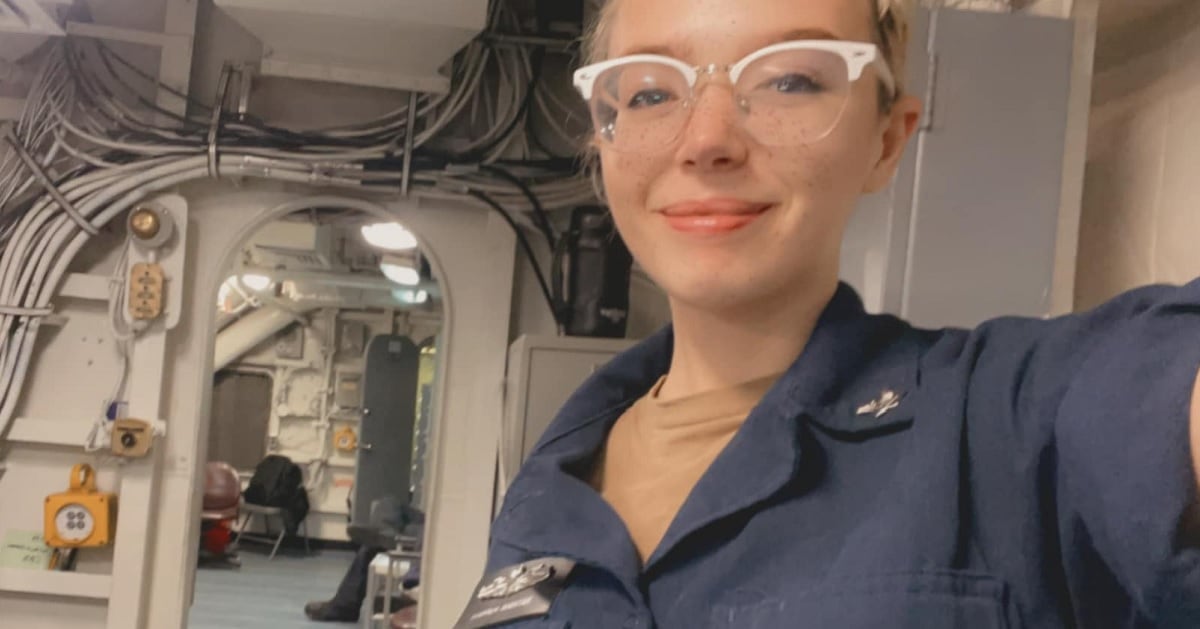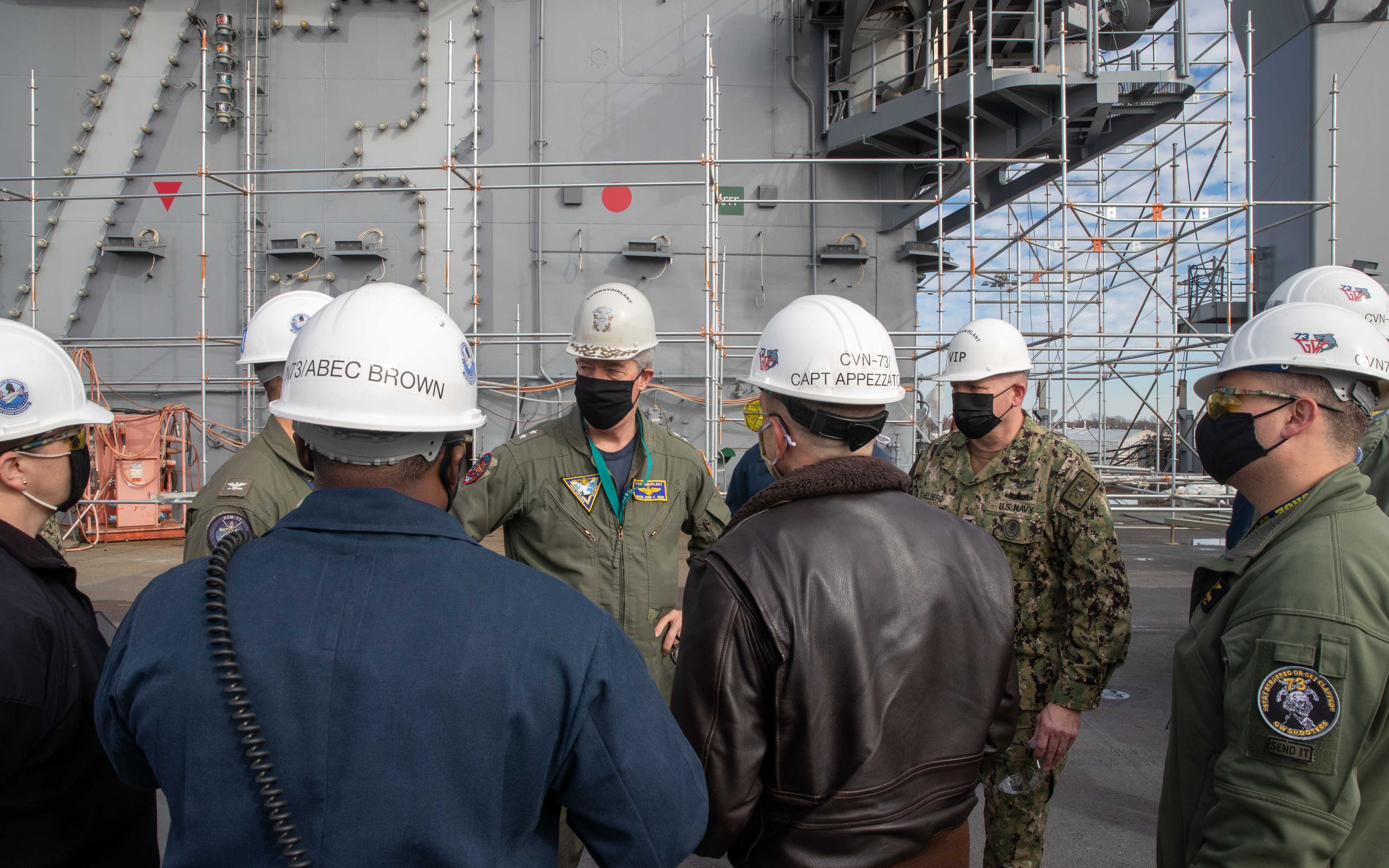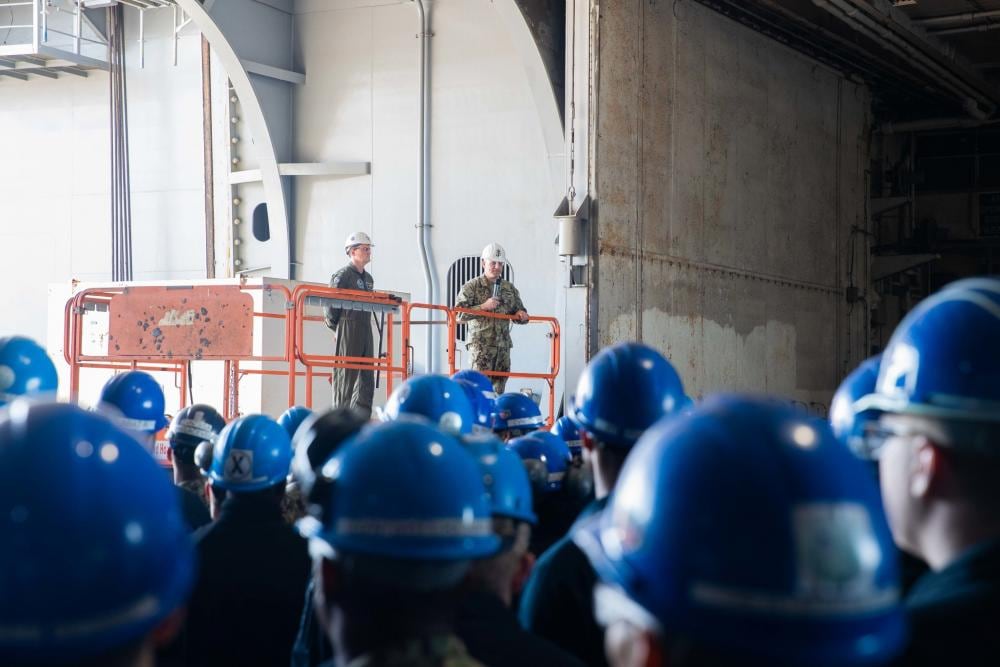As sailors assigned to the aircraft carrier George Washington cope with three suicides among their shipmates in the past two weeks, and as the ship continues a lengthy and extended maintenance overhaul in the desolation of Newport News, Virginia--resulting at times in no power or working bathrooms for those living onboard--the Navy’s top enlisted sailor brought a blunt message during a visit Friday.
Things could be worse.
During an all-hands call, Master Chief Petty Officer of the Navy Russell Smith admitted that working and living aboard a carrier undergoing such maintenance is tough. He said that Big Navy could do a better job to “manage expectations” about how bad it can be when it comes to working bathrooms, food and living in a construction zone.
In addition to grappling with at least seven deaths in their ranks over the past year, GW sailors have told Navy Times of living aboard a dismantled ship in an industrial no man’s land, of having to walk miles to get from their car to the ship and feeling like they’ve become little more than glorified paint chippers as the carrier stumbles toward its fifth year in the yard.
“It’s not a place for first-time sailors, where you’re sold all this stuff from a recruiter and you’re thrown on this ship where stuff doesn’t even work, berthings aren’t clean, bathrooms aren’t cleaned,” said a sailor who spoke with Navy Times and requested anonymity for fear of retaliation.
Smith told the embattled crew that he heard their concerns and that they should raise them, but that “you have to do so with reasonable expectations.”
“What you’re not doing is sleeping in a foxhole like a Marine might be doing,” he said, adding that much of the crew goes home each night, something that can’t be said for a deployed carrier.
“The downside is some of the shit that you have to go through logistically will drive you crazy,” Smith conceded during the 50-minute meeting.
While the Navy released a transcript of the all-hands call Monday, Navy Times obtained a recording of the confab.
The entire all-hands call recording is below:
GW’s maintenance period began in 2017 and was expected to wrap last year, following a refueling of the ship’s nuclear reactors and other work that would allow the ship to serve another 25 years.
But more work has popped up, and the Navy doesn’t expect the ship to leave the arguably uninhabitable environs of Newport News Shipbuilding until December.
Meanwhile, seven GW sailors have died in the past year, and four of those cases are believed to be suicides. The identities of these deceased sailors are, and the circumstances around their deaths, remains unclear.
As of Tuesday, Naval Air Force Atlantic, the GW’s parent command, has not released all the names of those shipmates who died, nor the dates on which they passed.
But at least three GW sailors have died by suicide this month alone, according to the Office of the Chief Medical Examine of Virginia.
Master-at-Arms Seaman Recruit Xavier H. Mitchell-Sandor died of a self-inflicted gunshot wound on April 15. Asked about the junior sailor’s death and whether it occurred while he was on watch, Navy spokesman Cmdr. Robert Myers said in a statement that Mitchell-Sandor was found “unresponsive” on the ship and transported to an area hospital where he was pronounced dead.
On April 10, Interior Communications Electrician 3rd Class Natasha Huffman died by hanging, according to the medical examiner.
Myers declined to comment on Huffman’s death, but said she was found dead at an off-base location in nearby Hampton, Virginia.
RELATED

A day before that, Retail Services Specialist 3rd Class Mika’il Rayshawn Sharp also died from a self-inflicted gunshot wound , according to the medical examiner.
That sailor was also found dead at a separate off-base location in Hampton, near where the George Washington is undergoing its mid-life refueling and overhaul work, Myers said.
Myers declined to comment further on the cases, citing ongoing investigations, nor did he respond to emails asking which civilian law enforcement agencies were involved in the probes.
Smith said Friday that the Navy had hired hundreds of additional mental health personnel, but that the United States in general is grappling with a shortage of such providers.
Navy officials did not respond to questions about the extent of such shortages by Navy Times’ deadline Tuesday.
The conditions aboard GW have attracted the attention of lawmakers as well.
On Tuesday, U.S. Rep. Elaine Luria, a Democrat and retired surface warfare officer who represents the region, sent a letter to Chief of Naval Operations Adm. Mike Gilday, demanding answers.
“Each death is a tragedy, and the number of incidents under a single command raises significant concern that requires immediate and stringent inquiry to ensure the safety and wellbeing of the ship’s crew,” Luria wrote.
‘Real shitty work’
During Friday’s all-hands, Smith likened the GW crew’s current yard mission to a SEAL team on which he served, and suggested that a bit more camaraderie could help.
“The only difference between sailors on a carrier and sailors at SEAL Team 4 is the attitude between them as teammates, because we both have shitty jobs,” he said, shouting out the particularly thankless job of aviation boatswain’s mates, who handle all types of landing gear on the deck. “There’s no difference between that and being with a SEAL platoon in Colombia, hunkered off the side of a river in knee-deep mud…doing real shitty work, they’re both hard to do.
“The difference is the camaraderie between them and understanding that everybody’s needed on the team,” Smith said.
Smith told the sailors Friday that their work repairing the carrier and getting it back out to sea is vital to national security.
“You are sometimes going to be in a situation where you’re gonna have to walk 30 to 40 frames to find the working head,” said Smith, who also told sailors of his own times assigned to carriers in the yards earlier in his career.
Referencing paltry and subpar meal options aboard the ship-turned-construction-site, Smith said Marines in the field or deployed SEALs aren’t promised a hot meal either.
“Sometimes, you’re going to have to live through, and this is the circumstance in the community in which you serve and in which you live,” he said.
“I am not going to have an answer that’s going to make you real happy,” Smith said. “What I can tell you is, this is what happens on a carrier in (refueling complex overhaul maintenance periods).”
The Navy can’t simply hand the ship off to the yards during such overhaul work, Smith added. For example, the crew needs to be there in case a fire breaks out.
RELATED

“When someone walks by you at Starbucks, when you’re in uniform, and says, ‘thank you for your service,’ this is one of the things that they’re thanking you for, because they know that they can’t or they chose not to do that thing that you are doing,” Smith said. “And without you, we don’t have a capital ship, without you, we don’t have national defense.”
Anecdotally, Smith agreed with a sailor’s observation that more suicides happen on ships undergoing maintenance.
“You’re less happy because you don’t feel like you’re doing the thing that you came here to do, you’re hemorrhaging your technical abilities in whatever rating you’re in,” he said. “It’s not optimal. We know that.”
One sailor asked Smith about getting more amenities around the shipyard, which lies in a fairly isolated and desolate area.
Others spoke of the awful parking situation and having to walk a ways to get to their ship each day.
“At the end of the day, when you walk outside that fence line, it’s still the same Newport News…and we’re still telling sailors to go walk 20 blocks in a not-so-safe neighborhood,” said one sailor, whose name was not audible in the recording.
Smith said that military construction dollars are finite and getting businesses to set up shop in such an area is beyond the Navy’s control.
Smith said there are ways that a command can keep their crew motivated, but that the Navy’s doesn’t “legislate it, because everyone is different.”
He also thanked the crew for their sacrifices.
“This isn’t the thing we advertise generally with Navy recruiting,” Smith said. “I know it’s not easy.”
‘No place for first-term sailors’
One junior sailor assigned to GW told Navy Times last week that he thinks the ship’s command does its best, and that such maintenance periods are awful by nature.
“The whole triad, they do their best to set the tone, and it’s not their fault,” he said. “It’s just the evolution itself that is the problem.”
“RCOH is no place for first-term sailors,” he added. “They need to be out on an operational boat and learning their jobs, learning what the Navy is actually like.”
Smith said Friday that he wishes that was the way it works, even if it does not.
The sailor said he doesn’t think the maintenance period is driving deaths among the crew, but that such realities certainly don’t help struggling sailors.
“There are other things going on in their lives that contribute to it, but the ship is the straw that broke the camel’s back,” he said.
Little things tend to grate, he said, such as having to walk more than a mile from the parking lot to the ship.
“When you’re working a 12-hour day, that’s a pain in the butt,” he said.
The sailor said that he and other shipmates have opted to sleep in their cars some nights, because there is no power or running water in their berthing due to the maintenance work.
AIRLANT officials did not confirm how many sailors permanently live aboard GW. Some departments lock up their heads, the sailor alleged, so hundreds of sailors are left to rely on a single bathroom, and contractors urinate and defecate in random spaces to avoid the long walk to a working head.
“You’re never going to make everyone happy, but taking a serious look at it is the most important thing,” he said.
Geoff is the managing editor of Military Times, but he still loves writing stories. He covered Iraq and Afghanistan extensively and was a reporter at the Chicago Tribune. He welcomes any and all kinds of tips at geoffz@militarytimes.com.





